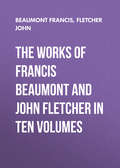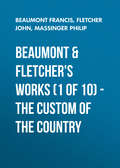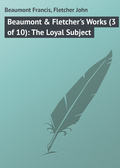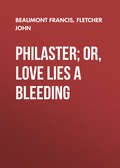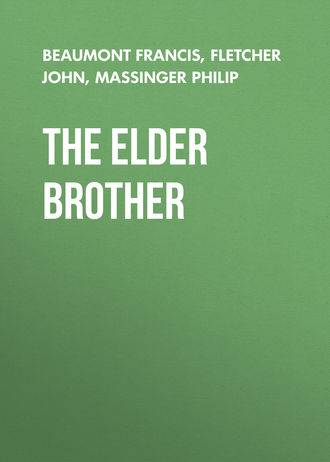
Beaumont Francis
The Elder Brother
Actus 2. Scena I
Miramont, Brisac.
Nay Brother, brother. Bri. Pray Sir be not moved,
I meddle in no business but mine own,
And in mine owne 'tis reason I should governe.
Mir. But how to govern then, and understand Sir,
And be as wise as y'are hasty, though you be
My brother, and from one bloud sprung, I must tell yee
Heartily and home too. Br. What Sir? Mir. What I grieve to find
You are a foole, and an old foole, and that's two.
Bri. We'l part 'em, if you please. Mir. No they're entailed to 'em.
Seeke to deprive an honest noble spirit,
Your eldest Son Sir? and your very Image,
(But he's so like you that he fares the worse for't)
Because he loves his booke and doates on that,
And onely studies how to know things excellent,
Above the reach of such course braines as yours,
Such muddy fancies, that never will know farther
Then when to cut your Vines, and cozen Merchants,
And choake your hide-bound Tenants with musty harvests.
Bri. You go to fast. Mir. I'm not come too my pace yet;
Because h' has made his studie all his pleasure,
And is retyr'd into his Contemplation,
Not medling with the dirt and chaffe of nature,
That makes the spirit of the mind mud too,
Therefore must he be flung from his inheritance?
Must he be dispossess'd, and Mounsieur Gingle boy
His younger brother— Bri. You forget your self.
Mir. Because h' has been at Court and learn'd new tongues,
And how to speak a tedious peece of nothing;
To vary his face as Seamen do their Compass,
To worship images of gold and silver,
And fall before the she Calves of the Season,
Therefore must he jump into his brothers land?
Bri. Have you done yet, and have you spake enough, In praise of learning, Sir? Mir. Never enough.
Bri. But brother do you know what learning is?
Mir. It is not to be a justice of Peace as you are,
And palter out your time ith' penal Statutes.
To heare the curious Tenets controverted
Between a Protestant Constable, and Jesuit Cobler,
To pick natural Philosophic out of bawdry,
When your Worship's pleas'd to correctifie a Lady;
Nor 'tis not the main moral of blinde Justice,
(Which is deep learning) when your worships Tenants
Bring a light cause, and heavie Hennes before yee,
Both fat and feesible, a Goose or Pig,
And then you sit like equity with both hands
Weighing indifferently the state oth' question.
These are your quodlibets, but no learning Brother.
Bri. You are so parlously in love with learning,
That I'de be glad to know what you understand, brother.
I'me sure you have read all Aristotle. Mir. Faith no,
But I beleeve, I have a learned faith Sir,
And that's it makes a Gentleman of my sort;
Though I can speak no Greek I love the sound on't,
It goes so thundering as it conjur'd Devils.
Charles speakes it loftily, and if thou wert a man,
Or had'st but ever heard of Homers Iliads,
Hesiod, and the Greek Poets, thou wouldst run mad,
And hang thy self for joy th' hadst such a Gentleman
To be thy son; O he has read such things
To me! Bri. And you do understand 'm Brother?
Mir. I tell thee no, that's not material; the sound's
Sufficient to confirme an honest man:
Good brother Brisac, do's your young Courtier
That weares the fine cloathes, and is the excellent Gentleman,
(The Traveller, the Souldier, as you think too)
Understand any other power than his Taylor?
Or knowes what motion is more than an Horse race?
What the moon meanes, but to light him home from Taverns?
Or the comfort of the Sun is, but to weare slash't clothes in?
And must this peece of ignorance be popt up,
Because 't can Kisse the hand, and cry sweet Lady?
Say it had been at Rome, and seen the Reliques,
Drunk your Verdea wine, and ridde at Naples,
Brought home a pox of Venice treacle with it,
To cure young wenches that have eaten ashes:
Must this thing therefore?– Bri. Yes Sir this thing must,
I will not trust my land to one so sotted,
So grown like a disease unto his studie;
He that will fling off all occasions
And cares, to make him understand what state is,
And how to govern it, must by that reason,
Be flung himself aside from managing:
My younger boy is a fine Gentleman.
Mir. He is an asse, a peece of Ginger-bread, Gilt over to please foolish girles puppets.
Bri. You are my elder Brother. Mir. So I had need,
And have an elder wit, thou'dst shame us all else.
Go too, I say, Charles shall inherit. Bri. I say no,
Unless Charles had a soul to understand it;
Can he manage six thousand Crowns a yeare
Out of the Metaphysicks? or can all
His learn'd Astronomy look to my Vineyards?
Can the drunken old Poets make up my Vines?
(I know they can drinke 'm) or your excellent Humanists
Sell 'm the Merchants for my best advantage?
Can History cut my hay, or get my Corne in?
And can Geometrie vent it in the market?
Shall I have my sheepe kept with a Jacobs staffe now?
I wonder you will magnifie this mad man,
You that are old and should understand. Mir. Should, sai'st thou,
Thou monstrous peece of ignorance in office!
Thou that hast no more knowledge than thy Clerk infuses,
Thy dapper Clerk larded with ends of Latin,
And he no more than custom of offences;
Thou unrepriveable Dunce! that thy formal band strings,
Thy Ring nor pomander cannot expiate for,
Do'st thou tell me I should? Ile pose thy Worship
In thine own Libraty an Almanack,
Which thou art dayly poring on to pick out
Dayes of iniquity to cozen fooles in,
And full Moones to cut Cattel; do'st thou taint me,
That have run over Story, Poetry,
Humanity? Bri. As a cold nipping shadow
Does ore eares of Corne, and leave 'em blasted,
Put up your anger, what Ile do Ile do.
Mir. Thou shall not doe. Bri. I will. Mir. Thou art an Asse then,
A dull old tedious Asse, th['] art ten times worse
And of lesse credit than Dunce Hollingshead
The Englishman, that writes of snowes and Sheriffes.
Enter Lewis.
Bri. Wel take you pleasure, here's one I must talke with.
Lew. Good day Sir. Bri. Faire to you Sir. Lew. May I speake w'ye?
Bri. With all my heart, I was waiting on your goodness.
Lew. Good morrow Mo[n]sieur Miramont. Mir. O sweet Sir,
Keep your good morrow to coole your Worships pottage,
A couple of the worlds fooles met together
To raise up dirt and dunghils. Lew. Are they drawne?
Bri. They shall be ready Sir, within these two houres;
And Charles set his hand. Lew. 'Tis necessary;
For he being a joint purchaser, though your state
Was got by your owne industrie, unlesse
He seale to the Conveyance, it can be
Of no validity. Bri. He shall be ready,
And do it willingly. Mir. He shall be hang'd first.
Bri. I hope your daughter likes. Lew. S[h]e loves him well Sir.
Young Eustace is a bait to catch a woman,
A budding spritely fellow; y'are resolved then,
That all shall passe from Charles. Bri. All all, hee's nothing,
A bunch of bookes shall be his patrimony,
And more then he can manage too. Lew. Will your brother
Passe over his land to, to your son Eustace?
You know he has no heire. Mir. He will be flead first,
And horse-collars made of 's skin! Bri. let him alone,
A wilful man; my state shall serve the turne, Sir.
And how does your Daughter? Lew. Ready for the houre,
And like a blushing Rose that staies the pulling.
Bri. To morrow, then's the day. Lew. Why then to morrow Ile bring the Girle; get you the Writings ready.
Mir. But hark you Monsieur, have you the vertuous conscience
To help to robb an heire, an Elder Brother,
Of that which Nature and the Law flings on him?
You were your fathers eldest son, I take it,
And had his Land, would you had had his wit too,
Or his discretion to consider nobly,
What 'tis to deale unworthily in these things;
You'l say hee's none of yours, he's his son;
And he will say, he is no son to inherit
Above a shelfe of Bookes; Why did he get him?
Why was he brought up to write and reade, and know things?
Why was he not like his father, a dumbe Justice?
A flat dull peece of flegme, shap'd like a man,
A reverend Idoll in a peece of arras?
Can you lay disobedience, want of manners,
Or any capital crime to his charge? Lew. I doe not,
Nor do not weigh your words, they bite not me, Sir;
This man must answer. Bri. I have don't already.
And giv'n sufficient reason to secure me;
And so good morrow brother to your patience.
Lew. Good morrow Monsieur Miramont. Mir. Good night-caps
Keepe braines warme, or Maggots will breed in 'm.
Well Charles, thou shall not want to buy thee bookes yet,
The fairest in thy study are my gift,
And the University Lovaine for thy sake,
Hath tasted of my bounty, and to vex
Th' old doting foole thy father, and thy brother,
They shall not share a Solz of mine between them;
Nay more, Ile give thee eight thousand Crowns a year,
In some high strain to write my Epitaph.
Actus II. Scaena II
Eustace, Egremont, Cowsy.
How do I look now my elder Brother?
Nay, t'is a handsome Suit. Cow. All courtly, courtly.
Eust. Ile assure ye Gentlemen, my Taylor has travail'd,
And speaks as lofty Language in his bills too;
The cover of an old Book would not shew thus.
Fye, fie; what things these Academicks are?
These book-worms, how they look! Egr. Th'are mere Images,
No gentle motion nor behaviour in 'm,
They'l prattle ye of primum mobile,
And tell a story of the state of Heaven,
What Lords and Ladies govern in such houses,
And what wonders they do when they meet together,
And how they spit snow, fire, and hail like a Jugler,
And make a noise when they are drunk, which we call Thunder.
Cow. They are the sneaking'st things, and the contemptiblest;
Such small-beer brains, but aske 'em any thing
Out of the Element of their understanding,
And they stand gaping like a roasted Pig;
Do they know what a Court is or a Councel,
Or how th' affairs of Christendome are manag'd?
Do they know any thing but a tyred hackney?
And they cry absurd as the Horse understood 'em.
They have made a fair youth of your elder brother,
A pretty piece of flesh. Eust. I thank 'm for it,
Long may he study to give me his state.
Saw you my Mistress? Egre. Yes, shees a sweet young woman,
But be sure you keep her from Learning. Eust. Songs she
May have, and read a little unbak'd Poetry,
Such as the Dablers of our time contrive,
That has no weight nor wheel to move the mind,
Nor indeed nothing but an empty sound;
She shall have cloaths, but not made by Geometry;
Horses and Coach, but of no immortal race;
I will not have a Scholar in mine house
Above a gentle Reader; They corrupt
The foolish women with their subtle problems;
Ile have my house call'd Ignorance, to fright
Prating Philosophers from entertainment.
Cow. It will do well, love those that love good fashions,
Good clothes and rich, they invite men to admire 'm,
That speak the lisp of Court. Oh 'tis great Learning!
To ride well, dance well, sing well, or whistle Courtly,
Th' are rare endowments; that they have seen far Countries,
And can speak strange things, though they speak no truths,
For then they make things common. When are you married?
Eust. To morrow, I think, we must have a Masque Boyes,
And of our own making. Egre. 'Tis not half an houres work,
A Cupid and a fiddle, and the thing's done,
But let's be handsome, shall's be Gods or Nymphs?
Eust. What, Nymphs with beards? Cow. That's true, we'l be Knights then, Some wandring Knights, that light here on a sudden.
Eust. Let's go, let's go, I must go visit, Gentlemen, And mark what sweet lips I must kiss to morrow. Exeunt.
Actus II. Scena III
Cook, Andrew, Butler.
And how do's my Master? And. Is at's book, peace Coxcomb,
That such an unlearn'd tongue as thine should ask for him!
Co. Do's he not study conjuring too? And. Have you
Lost any Plate, Butler? But. No, but I know
I shall to morrow at dinner. And. Then to morrow
You shall be turn'd out of your place for't; we meddle
With no spirits oth' Buttry, they taste too small for us;
Keep me a Pye in folio, I beseech thee,
And thou shall see how learnedly Ile translate him;
Shalls have good cheer to morrow? Coo. Ex. Lent, good cheer Andrew.
And. The spight on't is, that much about that time,
I shall be arguing, or deciding rather,
Which are the Males or Females of red Herrings
And whether they be taken in the red Sea onely,
A question found out by Copernicus,
The learned Motion-maker. Co. I marry Butler,
Here are rare things; a man that look'd upon him,
Would swear he understood no more than we do.
But. Certain, a learned Andrew. And. I've so much on't
And am so loaden with strong understanding,
I fear, they'l run me mad, here's a new instrument,
A metamatical glister to purge the Moon with,
When she is laden with cold flegmatick humours,
And here's another to remove the Stars,
When they grow too thick in the Firmament.
Co. O heavens! why do I labour out my life
In a beef-pot? and only search the secrets
Of a Sallad; and know no farther! And. They are not
Reveal'd to all heads; These are far above
Your Element of Fire. Cooke. I could tell you
Of Archimides glass to fire your coals with,
And of the Philosophers turf that nere goes out;
And Gilbert Butler, I could ravish thee,
With two rare inventions. But. What are they Andrew?
And. The one to blanch your bread from chippings base,
And in a moment, as thou wouldst an Almond,
The Sect of the Epicureans invented that;
The other for thy trenches, that's a strong one,
To cleanse you twenty dozen in a minute,
And no noise heard, which is the wonder Gilbert,
And this was out of Plato's new Idea's.
But. Why, what a learned Master do'st thou serve Andrew?
And. These are but the scrapings of his understanding, Gilbert;
With gods and goddesses, and such strange people
He deals, and treats with in so plain a fashion,
As thou do'st with thy boy that drawes thy drink,
Or Ralph there with his kitchin boyes and scalders.
Coo. But why should he not be familiar and talk sometimes, As other Christians do, of hearty matters, And come into the Kitchin, and there cut his breakfast?
But. And then retyre to the Buttry and there eat it,
And drink a lusty bowle to my younger Master
That must be now the heir will do all these,
I and be drunk too; These are mortal things.
And. My Master studies immortality. Coo. Now thou talk'st
Of immortality, how do's thy wife Andrew? My old Master
Did you no small pleasure when he procur'd her
And stock'd you in a farme. If he should love her now,
As he hath a Colts tooth yet, what sayes your learning
And your strange instruments to that my Andrew?
Can any of your learned Clerks avoid it?
Can ye put by his Mathematical Engine?
And. Yes, or Ile break it; thou awaken'st me,
And Ile peep ith' Moon this moneth but Ile watch for him.
My Master rings, I must go make him a fire,
And conjure ore his books. Coo. Adieu good Andrew,
And send thee manly patience with thy learning. Exeu.
Actus II. Scaena IV
Charles.
I have forgot to eat and sleep with reading,
And all my faculties turn into studie;
'Tis meat and sleep; what need I outward garments,
When I can cloathe my self with understanding?
The stars and glorious planets have no Taylors,
Yet ever new they are and shine like Courtiers.
The seasons of the yeare find no fond parents,
Yet some are arm'd in silver Ice that glisters,
And sovne in gawdy green come in like Masquers:
The Silk-worme spines her owne suit and her lodging,
And has no aid nor partner in her labours:
Why should we care for any thing but knowledge,
Or look upon the world but to contemne it?
Enter Andrew.
Would you have any thing? Cha. Andrew, I find
There is a flie grown o're the eye oth' Bull,
Which will go neere to blind the Constellation.
And. Put a gold-ring in's nose, and that will cure him.
Cha. Ariadne's crown's away too; two main starres
That held it fast are slip'd out. And. Send it presently
To Gallatteo the Italian Star-wright
Hee'll set it right againe with little labour.
Cha. Thou art a pretty Schollar. And. I hope I shall be; Have I swept bookes so often to know nothing?
Cha. I heare thou art married. And. It hath pleas'd your father
To match me to a maid of his owne choosing,
I doubt her constellation's loose too, and wants nailing,
And a sweet farme he has given us a mile off Sir.
Cha. Marry thy selfe to understanding, Andrew,
These women are Errata in all Authours,
They're faire to see to, and bound up in vellam,
Smooth, white and cleare, but their contents are monstrous;
They treat of nothing but dull age and diseases.
Thou hast not so much wit in thy head, as there is
On those shelves, Andrew. And. I think I have not Sir.
Cha. No, if thou had'st thould'st nere marryed a woman
In thy bosome, they're Cataplasmes made oth' deadly sins:
I nere saw any yet but mine own mother;
Or if I did, I did regard them but
As shadowes that passe by of under Creatures.
And. Shall I bring you one? lie trust you with my owne wife; I would not have your brother go beyond ye; Th'are the prittiest natural Philosophers to play with.
Cha. No, no, th'are Opticks to delude mens eyes with. Does my younger brother speake any Greek yet, Andrew?
And. No, but he speaks High Dutch, and that goes as daintily.
Cha. Reach me the bookes down I read yesterday,
And make a little fire and get a manchet;
Make cleane those instruments of brass I shew'd you,
And 'set the great Sphere by, then take the fox tayle
And purg the bookes from dust, last take your Lilly,
And get your part ready. And. Shall I go home Sir?
My wives name is Lilly, there my best part lyes, Sir.
Cha. I mean your Gammer, O thou dunderhead!
Would'st thou be ever in thy wives Syntaxis?
Let me have no noise nor nothing to disturb me,
I am to find a secret. And. So am I too,
Which if I you find, I shall make some smart for't.– Exeunt.
Actus 3. Scena 1
Lewis, Angellina; Sylvia, Notary.
This is the day my daughter Angellina,
The happy, that must make you a fortune,
A large and full one, my great care has wrought it,
And yours must be as great to entertaine it;
Young Eustace is a Gentleman at all points,
And his behaviour affable and courtly,
His person excellent, I know you find that,
I read it in your eyes, you like his youth,
Young handsome people should be match'd together,
Then followes handsome Ch[i]ldren, handsome fortunes;
The most part of his fathers state, my Wench,
Is ti'd in a joynture, that makes up the harmony;
And when y'are marryed. he's of that soft temper,
And so far will be chain'd to your observance,
That you may rule and turne him as you please.
What are the writings drawn on our side, Sir?
Not. They are, and here I have so fetter'd him, That if the Elder Brother set his hand to, Not all the power of law shall ere release him.
Lew. These Notaries are notable confident Knaves,
And able to doe more mischeife than an Army:
Are all your clauses sure? Not. Sure as proportion,
They may turne Rivers sooner than these writings.
Not. Why did you not put all the lands in, Sir?
Lew. Twas not condition'd. Not. If it had been found,
It had been but a fault made in the writing;
If not found all the Land. Lew. These are small Devils
That care not who has misch[ie]fe, so they make it;
They live upon the meere scent of dissension.
Tis well, tis well, Are you contented Girle?
For your wil must be known. Ang. A husband's welcom,
And as an humble wife He entertaine him,
No soveraignty I aime at, 'tis the mans Sir,
For she that seekes it, killes her husbands Honour:
The Gentleman I have scene, and well observ'd him,
Yet find not that grac'd excellence you promise,
A pretty Gentle man and he may please too,
And some few flashes I have hear'd come from him,
But not to admiration as to others;
Hee's young and may be good, yet he must make it,
And I may help, and help to thank him also.
It is your pleasure I should make him mine,
And't has beene still my duty to observe you.
Lew. Why then let's go, And I shall love your modesty. To horse, and bring the Coach out Angellina, To morrow you will looke more womanly.
Ang. So I looke honestly, I feare no eyes, Sir. Exeunt.
Actus III. Scaena II
Brisac, Andrew, Cooke, Lilly.
Wait on your Master, he shall have that befits him;
And. No inheritance, Sir? Bri. You speak like a foole, a coxcomb,
He shall have annual meanes to buy him bookes,
And find him cloathes and meat, what would he more?
Trouble him with Land? tis flat against his nature:
I love him too, and honour those gifts in him.
And. Shall Master Eustace have all? Bri. All, all, he knowes how
To use it, hee's a man bred in the world,
T'other ith' heavens: my Masters, pray be wary,
And serviceable; and Cooke see all your sawces
Be sharp and poynant in the pallat, that they may
Commend you; looke to your roast and bak'd meates hansomly,
And what new kickshawes and delicate made things—
Is th' musick come? But. Yes Sir, th'are here at breakfast.
Bri. There will be a Masque too, you must see this roome clean,
And Butler your doore open to all good fellowes,
But have an eye to your plate, for their be Furies;
My Lilly welcome, you are for the linnen,
Sort it, and see it ready for the table,
And see the bride-bed made, and looke the cords be
Not cut asunder by the Gallants too,
There be such knacks abroad; hark hither, Lilly,
To morrow night at twelve a clock, Ile suppe w'ye,
Your husband shall be safe, Ile send ye meat too,
Before I cannot well slip from my company.
And. Will ye so, will you so, Sir? Ile make one to eate it, I may chance make you stagger too. Bri. No answer, Lilly?
Lil. One word about the linnen; Ile be ready,
And rest your worships still. And. And Ile rest w'yee,
You shall see what rest 'twill be: Are ye so nimble?
A man had need have ten paire of eares to watch you.
Bri. Wait on your Master, for I know he wants ye,
And keep him in his studie, that the noise
Do not molest him: I will not faile my Lilly—
Come in sweet hearts, all to their several duties. Exeunt.
And. are you kissing ripe, Sir? Double but my farm
And kisse her till thy heart ake; these smocke vermin,
How eagerly they leap at old mens kisses,
They lick their lipps at profit, not at pleasure;
And if't were not for th' scurvie name of Cuckold,
He should lye with her, I know shee'l labour at length
With a good lordship. If he had a wife now,
But that's all one, lie fit him: I must up
Unto my Master, hee'l be mad with studie— Exit.



